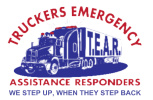What you can do as a company to support truck drivers during the Coronavirus Pandemic.
Too often we see companies who produce “We Love Truck Drivers” memes to post on their social networks, and that’s it. Maybe they might host a hot dog lunch day once or twice a year, give out a few inexpensive freebies in September during Truck Driver Appreciation week, but as a matter of standard operating procedure, they are lost when it comes to thinking outside the box to support truck drivers year round who live on the road.
Now that the Coronavirus pandemic has reached the United States, we are beginning to see its impact; it is important that we realize that saying “Thank You” to the previously invisible workforce behind the wheel must go the extra mile. When it comes to long-haul truck drivers, many who stay on the road for weeks, perhaps months at a time, it is very likely many of them will become infected with the Coronavirus. They will be alone, in a town where they do not know anyone and won’t know their way around. Not if, but when these truck drivers become sick in their trucks; they will need help.
Each local area, city, state and county should prepare for the inevitable scenario when truck drivers begin to call for assistance. When they are alone in their tractor sick and need help. They may have a pet with them, they may have a 53 foot trailer they need to secure. They may not be able to care for themselves and they will need a support system beginning with their own trucking company, brokers, the shippers and receivers they are servicing. Even the communities where distribution centers are located can help. Start now to help compile a quick resource list on paper to get to the truck drivers. Do it now, rather than later. This should not be on your website only, it should be also on paper that can be handed to drivers who are picking up and delivering to your area. It should be something that support groups on Facebook can post but realize, many drivers do not use the internet. They get very little real time information when they are working.
Companies:
Step One: Talk to your drivers personally NOW, if you have not already. Let them know you care about their health and safety and that you want to create an action plan to support their needs during this difficult time.
Ask them what they currently have for supplies and what they need to get.
Step Two: Once you determine what they have and what they need, make it a priority for them to acquire supplies as soon as possible.
Truck drivers must have personal protection equipment (PPE), ask your drivers if they have adequate hand sanitizer, gloves, mask, wipes and disinfectant on their truck. Help them find out how to make due with homemade PPE if necessary. Masks, Sanitizer etc.
Do they have an adequate food supply on their truck?
Have them prepare for a self-quarantine scenario in case they become infected somewhere on the road and become unable to shop or buy food at a restaurant.
Find out if your drivers have solution for going to the bathroom in an urgent emergency on the truck. A camp toilet can fit in a tractor but a quick cheap solution is a 5 gallon bucket, trash liners and a toilet seat. Make sure they are educated on the proper disposal of human waste and urge them to use this solution only in an emergency.
Teamwork:
Before booking loads with brokers think about the shippers/receivers who detain drivers and do not let them use their bathrooms. Don’t put your drivers in this predicament. Even under normal conditions, many shipper and receiving facilities will deny truck drivers use of their bathrooms. Do not subject your truck drivers to this inhumane treatment during this time. A porta -potti in the parking lot is not enough! Truck drivers need access to running water so they can wash up. If a shipper/receiver cannot accommodate this, then you should not be servicing them during this pandemic! Call ahead to the shipping and receiving department specifically, ask them “Are bathrooms available for the truck drivers?” If not, do not book the load. Brokers have a role here as well. You know your customers, and you know who detains drivers an excessive amount of time. If they also cannot treat drivers with human dignity, don’t put a driver in this situation.
Create a plan for truck drivers if they begin to feel sick:
Find out what number your drivers should call for tele-health , Doctor On-Demand services if they become sick on the road. This could be part of your company health plan coverage. Whatever it is, make it easy for your drivers to have access to this number so they can learn if they should go to the closest hospital or self-quarantine themselves.
If your driver does need to go to the hospital after speaking to a tele-health service, where should they go? Let them know you can help them while they are on the road to find a place to go. Make it a priority to help your drivers.
Create a plan for dropping trailers. Work with the brokers in your network, and the shippers/receivers you are servicing to ask if they have a drop trailer area in case of emergency your drivers can use. Communicate with State Department of Transportation officials for your region to find out if they have a plan in place for truck drivers who become sick on the road and need help to secure their equipment, transportation to a hospital, to a area they can self-quarantine , and also help with pets.
Do your truck drivers have a kingpin lock?
Inquire if area truck stops or drop yards will assist. Compile a resource list for truck drivers on paper to give to them, make sure they have contact numbers and confirm that tow truck companies will not boot their equipment beforehand. It is important that dropped trailers are secured if a driver must bobtail to the hospital. Find out if the shipper/receiver facility will help to accommodate this.
What about pets? Are there area foster groups that will volunteer to help truck drivers if needed?
Self – Quarantine Concerns:
Who will pay for motel room?
Will this be paid for by the company?
What motels will allow a pet and truck parking near the area local area?
Will you be compensating your truck drivers with hazard Pay?
Many of these local area questions can be put together in a list by the shipper/receiver facilities in advance to give to drivers as a courtesy handout. If your facility has hand sanitizer, disinfectant and hygiene items you should share it with truck drivers by preparing a care package to give them when they arrive. After all, they are risking their lives to work during this crisis and they are isolated from loved ones with very little access to services. Pass out bottles of water and Vitamin C packs, snacks and treat them with respect.
Finally, do not push drivers to deliver if they are sick.
Truck drivers are protected under the United States Department of Labor Occupational Safety and Health Administration Surface Transportation Assistance Act – Truck Driver Whistleblower
§31105 Employee protections Prohibits the discharge of an employee, or to discipline or to discriminate against an employee regarding pay, terms, or privileges of employment, under section (B) when the employee refuses to operate a vehicle because it violates a regulation, standard, or order of the United States related to commercial motor vehicle safety, health, or security; or if the employee has a reasonable apprehension of serious injury to the employee or the public because of the vehicle’s hazardous safety or security condition.
Furthermore, coercion or badgering truck drivers to operate a commercial motor vehicle when they are ill or fatigued could land brokers, dispatchers and companies in hot water with the FMCSA and OSHA, you can read about Coercion reporting here on the FMCSA website.
Everyone in the supply chain, from trucking companies, to warehouse distribution centers, truck stop chains, brokers and community volunteers can help with some of these solutions to support truck drivers during this difficult period. Show them your truly appreciate the sacrifices they are making right now by pitching in and letting them know they have a support system nationwide during this national crisis.

